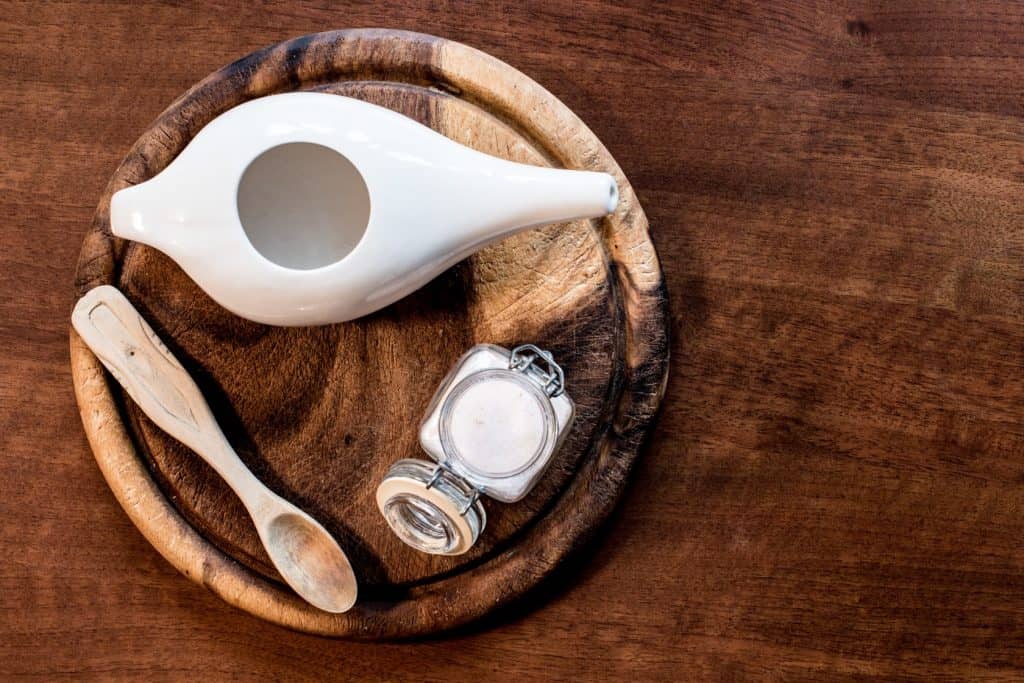Neti is an Ayurvedic practice that rinses and thoroughly cleanses the nasal passages with water. It is a very special ritual that not only clears the nose but also the head and can help to achieve more clarity and purity. Here we show you how nasal irrigation works and why you should think about incorporating Neti into your morning routine from now on.
What is Neti?
In Ayurveda, neti is a nasal cleansing that can be performed regularly. The practice is part of Hatha Yoga and is intended to harmonise the body and rebalance the three doshas. From an Ayurvedic point of view, an excessive Kapha Dosha can lead to mucus, which then settles in the typical Kapha regions such as the head and chest area. Neti is intended to loosen this phlegm so that we feel freer and more relaxed all over again.
Two types of Ayurvedic nasal irrigation
Neti has been used for many years in ancient India as a method of cleansing the nasal passages. There are several different ways to practise neti, but in Ayurveda, nasal rinsing is usually done with oil or water. Other possibilities would be the use of milk (Dughda Neti) or ghee (Ghrita Neti).
The two most well-known methods are certainly Sutra Neti, purification with a cotton thread, and Jala Neti, rinsing with water. Now let's take a closer look at these two practices.
Sutra Neti: Cleaning the nose with cotton thread

In this nasal cleansing procedure, a soft rubber catheter about 30 cm long or a waxed cotton string is passed through one nostril and then pulled out again through the mouth.
After the thread has been gently pulled back and forth a few times, it's time for the other nostril. Admittedly, the practice sounds a little strange at first.
In fact, it has a pleasant massaging effect and stimulates the reflex zones in the nose.
For this reason, it is said to be especially good for people with breathing problems or narrowed nostrils!
However, a little practice is needed before this technique really sinks in. If you have never tried it before, you should not try Sutra Neti alone!
If you still want to give it a try, be sure to do it under the watchful eye of a qualified yoga teacher. Only when you are a little more experienced can you do it yourself.
Jala Neti: the nasal rinse with salt water
In Jala Neti, the nose is rinsed with an isotonic salt water solution using a so-called Neti Pot. The neti pot looks a bit like Aladdin's magic lamp and has an elongated beak. The whole thing works like this: Water is poured into a nostril with the pot and can then simply flow out again via the mouth. This flushes the nasal passages properly and opens the airways. No wonder that the Jala Neti nasal douche has a fixed place in the Ayurvedic morning ritual for many!
Here, too, a little experimentation is necessary until the water runs as it should. But in contrast to Sutra Neti, this technique can be used even by non-professionals. We will now show you how.
Ayurvedic nasal rinsing: instructions for beginners
Do you want to clear your sinuses and thus increase your well-being? Why not try your hand at Jala Neti! All you need is a neti pot, which should ideally be made of ceramic, metal or toxin-free plastic and is available in health food stores or pharmacies. You can easily make the saline solution yourself. All you have to do is mix one teaspoon of sea salt or iodine-free salt with half a litre of warm water until it dissolves.
Then you are ready to go:
- Lean over a washbasin and tilt your head slightly.
- Now insert the beak of the jug into one nostril and pour the water in. Now open the mouth and simply let the water flow out again.
- Meanwhile, breathe through your mouth in a relaxed manner. With a little practice, you will quickly find the right position in which to hold your head so that the water can flow optimally.
- When the pot is half empty, put the head on the other side and change the nostril. When the pot is completely empty, blow your nose thoroughly again to remove all water residue. Your nose is now pleasantly free again!
If you wish, you can incorporate this practice into your Ayurvedic morning routine and do it daily before breakfast and morning yoga. Ideally, you should do it on an empty stomach in any case. If the salt water makes your nose feel a little dry, you can apply a little ghee to the mucous membranes with your finger afterwards.
Tip: Does the water burn your nose? Then it is most likely too cold, too little in quantity or with too much salt.
Not quite sure you're ready for it? No problem, as an alternative you can first try to pull up some cold water from a hollow hand with your nose. Once you have got used to the feeling, you can then try Jala Neti later on. Be brave!
This is what Jala Neti can do

After a pleasant morning shower, we immediately feel much better - and our nose feels the same way! Neti is a natural and gentle cleansing of the sinuses.
Natural salt is said to be particularly beneficial for the mucous membranes and respiratory tract and is therefore ideal for nasal rinsing. In this way, a nasal douche gently frees the body from waste products and mucus.
But the rinse is basically beneficial for all the sensory organs in the head and strengthens the eyes, nose and ears. Even the mind is said to benefit from it. Indian yoga teachings assume that clear breathing also leads to clear thinking.
The freer the nose is, the better thinking and meditation works. But that is not all that Jala Neti is supposed to do, because it has several other positive effects:
Cleanses the brow chakra and relieves headaches
Migraines and headaches can be a sign of a disturbed brow chakra. With the help of Jala Neti, the brow chakra is stimulated, which soothes the head and relieves stress. Neti can even have a calming effect on facial tension, anxiety, depression and anger. The head feels lighter again afterwards and you can start the new day with fresh courage.
Prevents colds and respiratory diseases
With the help of Jala Neti, relief or at least relief is to be provided for colds and respiratory diseases. It is said to have a positive effect on sinusitis and inflammation of the ears, eyes and throat. Those suffering from asthma or hay fever can also benefit because pollen, dust and bacteria are simply washed away.
Refreshes the spirit
Neti is also said to dispel tiredness and strengthen the ability to concentrate. The mind becomes clearer againand the brow chakra can flow freely again. This not only leads to an alert mind, but also strengthens the intuitive abilities again.
When should Neti not be performed?
In principle, neti is not dangerous and can be performed every morning. However, there are certain conditions under which it should be avoided. For example, if you suffer from chronic nosebleeds or serious problems in the ear, nose and throat area, it is better not to do it. After injuries or operations in the facial and especially nasal area, nasal rinsing should also be omitted for the time being. To be on the safe side, we recommend that you check with a doctor whether nasal irrigation is a good idea in your case.
Free your nose from waste products and clear your body and mind with Neti, the Ayurvedic nasal rinse! Take your time to try it out at your leisure and benefit from the cleansing effect. Once you get used to it, you will notice that you feel much freer and more cleansed after a morning nasal rinse ! With this in mind: Have fun trying it out!
Cover image: © MandriaPix - stock.adobe.com
Have you already had experiences that you would like to share with us or do you have further questions? Write us a comment!





